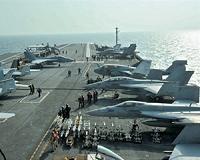| . |  |
. |
Washington (AFP) Dec 6, 2010 The best way to reduce the improvised explosive device threat in Afghanistan, the leading cause of death for troops there, is through the political process, as was the case in Iraq, a top US military officer said Monday. "The political reconciliation in Iraq was a major factor in reducing the IED threat. I do believe that's possible in Afghanistan although we're nowhere near where we need to be in that regard," said Lieutenant General Michael Oates, who heads a Pentagon unit to counter those threats. "Removing a significant sense of motivation for implanting IEDs is a major component," he told reporters at the Foreign Press Center in Washington. Training local forces, providing equipment and using explosive detection dog units was an essential part of the effort, he added. Some 1,200 incidents related to IEDs or other small-scale landmines that explode or are discovered before they detonate are reported each month in Afghanistan, compared to 4,000 in Iraq at the height of the conflict there. With this year being the deadliest for international coalition forces, IEDs have caused nearly 60 percent of the casualties. According to a tally kept by the independent icasualties.org website, 680 foreign troops have been killed in Afghanistan so far this year, including 469 US fighters. Although in Iraq the bombs were made of military-grade explosives and often remotely controlled, the IEDs being laid in Afghanistan are more rudimentary and are more difficult to detect, Oates said. "Military-grade munitions are harder to get in Afghanistan. Most of the Soviet material that was left over is unstable and there is an abundance of fertilizer available for use as homemade explosive," Oates explained. "It's easier and it works so there's no reason to change that motto. When you start using sophisticated detonation systems, you require a degree of education and training that may not be readily available in Afghanistan," he said. Troops are then left looking for fertilizer-based bombs that have low or no metallic content and are buried in unpaved, dirt roads, making them extremely tough to find. Under pressure from international allies, Afghan President Hamid Karzai in December 2009 prohibited the importation or use of fertilizers containing ammonium nitrate, an ingredient of the weapons. Border controls on the Pakistan frontier have also been strengthened, he added, saying the Pentagon believed that using both approaches "is going to have an impact" on containing the insurgents' strategy.
Share This Article With Planet Earth
Related Links News From Across The Stans
 Gates touts US air power role in Afghanistan war
Gates touts US air power role in Afghanistan warAboard Uss Abraham Lincoln (AFP) Dec 6, 2010 Defence Secretary Robert Gates on Monday told the crew of a US aircraft carrier that the ship's warplanes were dealing "lethal blows" to insurgents in Afghanistan. "When your aircraft come screaming, our troops hear the sound of relief and the enemy knows what's coming next," Gates told hundreds of sailors in a vast hangar on the USS Abraham Lincoln in the Arabian Sea. "You are deliverin ... read more |
|
| The content herein, unless otherwise known to be public domain, are Copyright 1995-2010 - SpaceDaily. AFP and UPI Wire Stories are copyright Agence France-Presse and United Press International. ESA Portal Reports are copyright European Space Agency. All NASA sourced material is public domain. Additional copyrights may apply in whole or part to other bona fide parties. Advertising does not imply endorsement,agreement or approval of any opinions, statements or information provided by SpaceDaily on any Web page published or hosted by SpaceDaily. Privacy Statement |